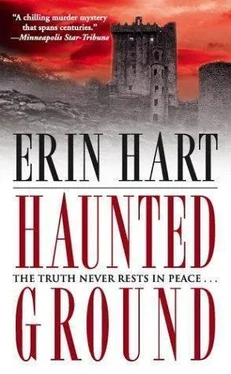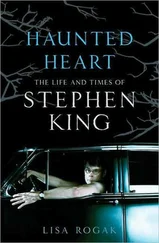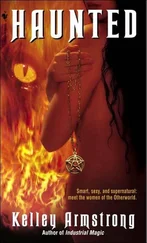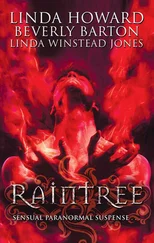“Hello? Cormac? Where are you?” It was Nora.
“Over here.” He heard her footsteps approaching.
“Sorry that phone call took so long. I should have been here ages ago, I know.” She came around the corner of the church, following the sound of his voice. “You’ll be happy to know it paid off. Dawson’s agreed to let us remove the piece of metal that showed up in the X rays. So that means I’ll have to be back for the dental exam on Monday, but you have my full assistance until then.” She paused, waiting for his response. “Well, isn’t that good news? You do want to find out who she is, don’t you?” He stood silent and frowning.
“Hello? Cormac?” Nora said, waving a hand in front of his face. “You haven’t heard a word I said.”
“No, I have, I have. But I’ve just been carrying on a very odd conversation myself.”
“With whom? There’s nobody here.”
“Brendan McGann. He’s just gone.” Cormac related the gist of his exchange with Brendan, and tried to describe what he’d seen in the man’s eyes when they spoke of Osborne.
“So Brendan believes there’s something between Hugh and his sister? What do you think?”
“I don’t know. Hugh Osborne’s a married man.”
“Whose wife has disappeared,” Nora said.
“This is none of our business anyway. Maybe we should give up speculating and try sticking to hard science while we’re here.”
They unloaded the surveying equipment from the jeep and, working from the maps Hugh Osborne had provided, began to measure the site and set up markers where the excavator should begin digging. The sound of car tires on gravel broke the silence, and soon Garrett Devaney approached them.
“How are you getting on?”
“Have you developed an interest in archaeology since we last met, Detective?” Cormac asked.
“Not exactly. I ran into Fintan McGann, and he told me what you were up to out here. I’ve been going through the old Osborne case file. And I thought with you working out here for a while, and staying up at the house, you might happen to pick up something useful.”
“Do you really think anybody’s going to talk to us? We’re strangers here.”
“You never know,” Devaney said. “But what I had in mind was more just keeping your eyes and ears open, letting me know if you notice anything that seems out of the ordinary.” He handed each of them a card. “The first number is the station in Loughrea, and the second is my home number; you can call at any time.”
“And what should we consider out of the ordinary?” Nora asked.
“You’ll know. Why? Was there something you’d like to tell me about?”
Cormac cut in. “No, Detective, I don’t think so, just wondering what you consider strange. Perfectly innocent behavior might appear unusual if you don’t know the background.”
“Indeed. I’m not asking you to betray any confidences, only to keep your eyes and ears open. A woman and a child have gone missing. They may very well be dead, and not one suspect has ever been charged. At this point, I’m willing to follow any sort of lead.”
When Devaney had returned to his car, Nora turned to Cormac. “You’re very cautious.”
“There’s a simple explanation for everything we’ve seen. Lots of farmers get a bit narky about traffic on the roads where they drive cattle. And lots of young lads get maggoty drunk once or twice. Not exactly front-page news.”
“You might feel different if it were someone you knew who was missing. Or dead.”
Just past midday, Una McGann was working at the loom when she heard a crash from the other side of the house. Brendan was off with Fintan tending the cattle; they weren’t due back until teatime, and Aoife was upstairs taking a nap after a long morning of make-believe. She stopped her shuttle to listen, trying to pinpoint where the noise was coming from. Sliding off the long bench seat, she moved quietly to the front hall, and followed the sounds to the closed door of Brendan’s room, directly behind the sitting room.
Una threw open the door to find a slightly dazed-looking hooded crow peering up at her from the middle of the floor, black wings shiny against the soft gray of its back.
“Well, Jaysus, Mary, and Joseph,” she said, her surprise melting into relief that it wasn’t a more dangerous intruder. “Just let me get the broom, you dirty bugger, and you’ll be outside before you know it.” She closed the door again, and retreated to the kitchen, where she fetched the broom, then opened the front door of the house. As she stepped into Brendan’s room, she and the bird eyed one another, each expecting the other to make the first move. The bird turned slowly on its large claws, keeping its head cocked and one shining black eye pointed in her direction.
“Out with you now,” she said, making a sudden lunge with the broom. “Out that door you go, now.”
But the bird opened its wings and tried to take off inside the small room, fluttering awkwardly over the bed and down behind it. Una gripped the bedpost and gave a mighty pull, then swept the astonished bird along the floor and straight out the bedroom door. Out in the hallway, it began once more to flap, but found the narrow walls too constricting, and skated on its claws toward the open front door, broom straw at its back. Outside, the bird remained grounded for only a brief instant before opening its dark wings and lifting up into the air and away.
Una’s heart was pounding. She could not imagine how the bloody thing had gotten into the house. Brendan was usually so careful about stopping all the chimneys with netting. She returned to his room to put things right. The books on his table were all awry. She knew he wouldn’t be at all pleased to know that she’d been in here messing about with his things, crow or no crow, so she tried to replace everything exactly as it had been. She straightened the coverlet on the narrow bed and was about to shove it back against the wall when she noticed a bit of paper sticking out from a hole in the plaster. There was a small hollowed-out place behind the head of the bed, with a folded sheet of paper hanging precariously from it. She smiled at the idea of Brendan keeping a secret place like a schoolboy, and was just pushing the paper back into place when she saw a bit of handwriting that spelled out her own name.
She hesitated, not wanting to intrude upon her brother’s privacy, but feeling that she was entitled to read something that bore her name. Slowly she drew the paper from its crevice.
“Eire—Ireland,” the heading ran, “BIRTH CERTIFICATE issued in pursuance of Births and Deaths Registration Acts 1863 to 1972.” Everything was written twice, in Irish and in English. “Ainm (ma tugadh)/Name (if any),” and in the space below, “Aoife.” Her own name was written in the space labeled “Name and Surname and Maiden Surname of Mother.” The space under “Name and Surname and Dwelling Place of Father” was blank.
Her first reaction was to tear up this reminder of the day, five years ago, when her daughter was born, a day that should have been a joyous celebration but instead had been twisted into something shameful by the vaguely disapproving looks of the nurses at the hospital in Dublin. She had never told anyone who Aoife’s father was, maintaining that it could have been any one of a half-dozen lads she’d known from university. Her aim had been to shock the prying busybodies, and judging from their looks she had succeeded, but it was an empty victory.
Why would Brendan have a copy of this certificate? And why should he keep it hidden? As she reached in to extract whatever else might be in the hiding place, she heard a small metallic clatter at her knee, and looked down to find a gold hair clasp. She turned it over to find two filigree elephants with their trunks entwined. Holding the clasp in her hand, feeling the weight of it, the roughness of the filigree against her fingers, Una remembered where she’d seen it before.
Читать дальше











